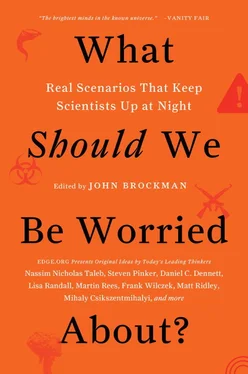For example, cooperative scientific problem solving is the most beautifully effective system for the production of reliable knowledge the world has ever seen. But the monsters haunting our collective intellectual enterprises typically turn us into idiots. Consider the cascade of collective cognitive pathologies produced in our intellectual coalitions by in-group tribalism, self-interest, prestige seeking, and moral one-upsmanship. It seems intuitive to expect that being smarter would lead people to have more accurate models of reality. On this view, intellectual elites therefore ought to have better beliefs and should guide their societies with superior knowledge. Indeed, the enterprise of science is—as an ideal—specifically devoted to improving the accuracy of beliefs. We can pinpoint where this analysis goes awry, however, when we consider the multiple functions of holding beliefs. We take for granted that the function of a belief is to be coordinated with reality, so that when actions are based on that belief, they succeed. The more often beliefs are tested against reality, the more often accurate beliefs displace inaccurate ones (e.g., through feedback from experiments, engineering tests, markets, natural selection). However, there is a second kind of function to holding a belief that affects whether people consciously or unconsciously come to embrace it—the social payoffs from being coordinated or discoordinated with others’ beliefs (Socrates’ execution for “failing to acknowledge the gods the city acknowledges”). The mind is designed to balance these two functions: coordinating with reality and coordinating with others. The larger the payoffs to social coordination and the less commonly beliefs are tested against reality, then the more often social demands will determine belief; network fixation of belief will predominate. Physics and chip design will have a high degree of coordination with reality, while the social sciences and climatology will have less.
Because intellectuals are densely networked in self-selecting groups whose members’ prestige is linked (e.g., in disciplines, departments, theoretical schools, universities, foundations, media, political/moral movements, and other guilds), we incubate endless self-serving elite superstitions, with baleful effects: Biofuel initiatives starve millions of the planet’s poorest. Economies around the world still apply epically costly Keynesian remedies despite decisive falsification of Keynesian theory by the postwar boom. (Government spending was cut by two-thirds and 10 million veterans were dumped into the labor force, while Paul Samuelson predicted “the greatest period of unemployment and industrial dislocation which any economy has ever faced.”) I personally have been astonished over the last four decades by the fierce resistance of the social sciences to abandoning the blank-slate model in the face of overwhelming evidence that it is false. As physicist Richard Feynman pithily put it, “Science is the belief in the ignorance of experts.”
Sciences can move at the speed of inference when individuals need only to consider logic and evidence. Yet sciences move glacially (Max Planck’s “funeral by funeral”) when the typical scientist, dependent for employment on a dense in-group network, has to get the majority of her guild to acknowledge fundamental embarrassing errors. To get science systematically moving at the speed of inference—the key precondition to solving our other problems—we need to design our next-generation scientific institutions to be more resistant to self-organizing collective delusions by basing them on a fuller understanding of our evolved psychology.
HELEN FISHER
Biological anthropologist, Rutgers University; author, Why Him? Why Her? How to Find and Keep Lasting Love
Scientists and laymen have spent the last fifty years dispelling myths about women. I worry that journalists, academics, and laymen will continue to perpetuate an equal number of myths about men. Annually, in 2010, 2011, and 2012, I have conducted a national survey of singles in collaboration with a U.S. dating service. Together we designed a questionnaire with some 150 queries (many with up to 10 sub-questions) and polled over 5,000 single men and women. We did not sample the members of the dating site; instead, we collected data on a national representative sample based on the U.S. census. All were divorced, separated, widowed, or had never married; none were engaged, living with a partner, or in a serious relationship. Included were the appropriate number of blacks, whites, Asians, and Latinos; gays, lesbians, bisexuals, and heterosexuals; rural, suburban, and urban folks from every region of the United States, ranging in age from twenty-one to seventy-plus. The data paint a different portrait of men than do America’s chattering class.
Foremost, men are just about as eager to marry as women. In the 2011 sample of people in their twenties, 68 percent of the men wanted to wed, along with 71 percent of the women, and 43 percent of the men and 50 percent of the women hoped to have children. Journalists have suggested that men want children because they don’t have to change diapers. But men spend a great deal of metabolic energy at child care. To support their young, men take the dangerous jobs—90 percent of people who die at work are men. Moreover, men universally confront an intruding thief and generally drive the family car through the raging blizzard.
Men aren’t “players,” either. When asked about their approach to dating, only 3 percent replied, “I would just like to date a lot of people.” Men are as eager to find a partner as women are; indeed, men find loneliness as stressful as women do. And men are far less picky in their search. In the 2011 sample, only 21 percent of them reported that they “must have,” or find it “very important” to have, a mate of their ethnic background, vs. 31 percent of women. Only 18 percent of men (as opposed to 28 percent of women) reported that they “must have,” or find it “very important” to have, a partner of the same religion. The men were less interested than were the women in a partner of the same educational background and political affiliation. And 43 percent of the men in their thirties and forties would make a commitment to a woman who was ten or more years older. Women are the picky sex.
Men fall in love faster, too—perhaps because they are more visual. Men experience love at first sight more regularly than women, and men fall in love just as often. Indeed, men are just as physiologically passionate as women. When my colleagues and I have scanned men’s brains using fMRI, we have found that they show as much activity as do women in neural regions linked with feelings of intense romantic love. Interestingly, in the 2011 sample we also found that when men fall in love they are faster to introduce their new partner to friends and parents, more eager to kiss in public, and want to “live together” sooner. Then, when they’re settled in, men have more intimate conversations with their wives than women do with their husbands—because women have many of their intimate conversations with their girlfriends. Last, men are just as likely as women to believe that you can stay married to the same person forever (76 percent of both sexes). And data from other studies show that after a break-up men are 2.5 times more likely to kill themselves.
In fact it is women who seek more independence in a committed relationship. Women want more personal space (77 percent of women vs. 56 percent of men). More women are reluctant to share their bank account (35 percent of women vs. 25 percent of men). Women are more eager to have girls’ night out (66 percent) than men are to go out with the boys (47 percent); and women are more likely to want to vacation with their female buddies (12 percent) than men with their male buddies (8 percent).
Читать дальше












